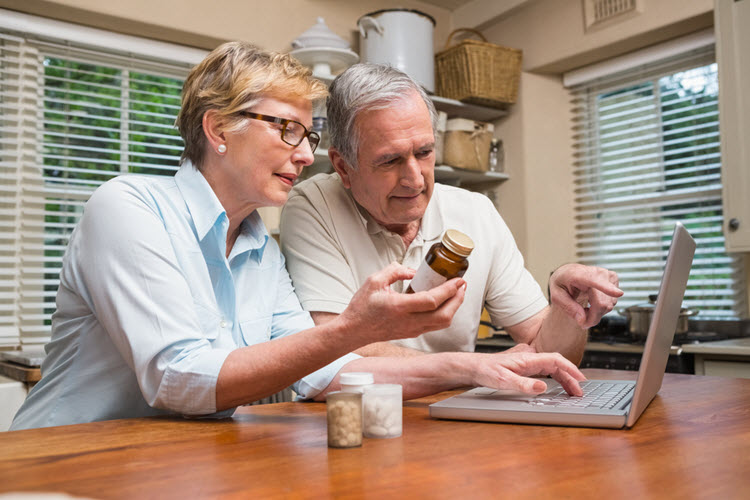Financial help is available if you can’t afford your medication.
Grant monies are one way in which our aging loved ones can receive financial help for medication. In a recent blog, I shared how upset my father was when he could not remember if he had re-applied to fund the co-pay for his macular degeneration shots. (Caregiver Burnout: When your parents become like your children).
(Jump to Lessons Learned)
Macular degeneration shots are expensive, around $1,500 per shot, and he received one every 6 weeks. They did help in halting the progression of this disease and that allowed him to continue to drive locally and keep his independence. But the co-pay for this medication was more than the budget would allow.
Dad got financial help from Good Days (formally Chronic Disease Fund (CDF) mygooddays.org. Good Days is a 501(c)(3) non-profit organization that helps patients with certain chronic medical conditions pay their insurance co-pays. Dad learned of this organization from either his eye doctor or pharmacist. To become eligible for the financial assistance program, he had to complete an application form, HIPAA authorization form, and provide proof of income.
As a non-profit charitable organization, they could not guarantee that funding for his specific disease would be available to him each year. So I understand why he was so shaken when he could not remember if he had re-applied in enough time.
Prescription drug assistance is available from a variety of places: pharmaceutical companies, your county, state and the federal government, from non-profit organizations and even several charities. These assistance programs vary widely. Some programs are limited to low income seniors, and individuals without health insurance. Others help moderate and middle income patients. It can be a daunting task to find the program that you qualify for and fit the income limits. Fortunately, doctors and pharmacies are aware of these programs, so start there.
Types of programs available:
- Medicare drug benefit Extra Help
- Medicaid
- Medicare Savings Programs
- State pharmaceutical assistance programs (SPAPS)
- Charity programs
- Patient Assistance Programs (PAPs)
- Prescription drug discount cards
- Safety Net Providers
For more details on each program see my source at: (Programs that help pay for perscriptions)
How do you find these assistance programs? There are several websites that allow you to look up assistance programs using a search feature. For example, Medicare.gov allows you to look up a specific drug, then lists the available programs with contact information for that drug. I searched this site on Humira and found four listings: three from the manufacturer, including the manufacturer’s foundation, and the Patient Access Network Foundation. Source: Pharmaceutical-assistance-program
Another website, Partnership for Prescription Assistance website requires you to qualify as the first step. Search on the drug name, fill out basic drug coverage and personal information to see which drug prescription program you may be eligible to use. You still must print, complete and mail an application to all programs to which you apply. Source: pparx.org
- When you are researching different assistance programs, look at the eligibility criteria for each listing carefully, they may be different.
- Once you have found an assistance program, the real work begins. You need to gather supporting documentation: current prescription plan, doctors consent, proof of financial status and personal information.
- If you are doing the research for your parents, you will need to have a handle on their financial situation. We are back to the importance of having what can be a difficult conversation with adults who may be reluctant to share this information. As long as you are headed down this path, I urge you to include the topic of durable power of attorney for finances if you have not done so yet. More at: Durable Power of Attorney
- Consider switching to generic drugs or less expensive brand names to cut costs.
- Take a look at using mail order or online pharmacy’s. Typically, you are allowed to get a larger quantity of medication for the same co-pay. Some will even call the doctor for you to request a prescription refill.
- You can also compare prices of prescription drugs online or call your local pharmacy. Some of the best prices can be found at places like Costco.
- Additional resources:
- NeedyMeds is a national non-profit organization with a ton of information on a variety of programs. They even offer a free NeedyMeds alert app. Needy Meds
- Healthfinder.gov has descriptions of different organizations that offer financial help along with links to websites.Healthfinder.gov
- Need Help Paying Bills offers information on more than just financial help for prescription drugs. Need Help Paying Bills
- Sites that translate into Español:
- Patient Advocate lists resource for medication assistance. I’m not bilingual so I’m not 100% sure if the resources page translated. Leave me a comment if it does! Patient Advocate Org
- SSA.gov describes Medicare Extra Help. You must have limited income, reside in one of the 50 states or DC and be receiving Medicare. Medicare Extra Help
- Consumer Reports 8 ways to save on prescription drugs. Consumer Reports
Disclaimer: The material in this blog is for educational purposes only. It is not intended to replace, nor does it replace, consulting with a physician, lawyer, accountant, financial planner or other qualified professional.

